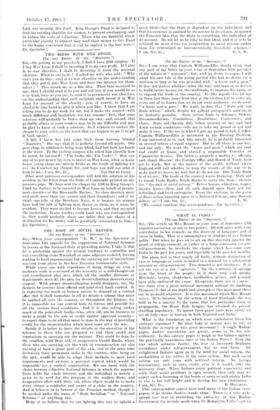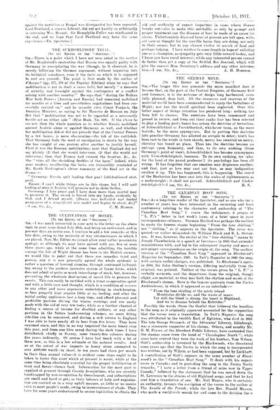WHAT IS INDIA ?
[To THE EDITOT OF THE "SPECTAT03."] Son,—The article on Mrs. Besant in your issue of September 20111 requires correction on one or two points. All will agree with your contributor in his remarks on the diversity of languages and 01 races in India. That is a commonplace of students of our Indian polity. But when he goes on to set up this diversity against the grant of self-government, or rather of a large e011eessi011 Mean:, self-government, he overlooks the change which has come user India in the past few years, and especially in the past few n,„,, Ilm.
The plain fact is that nearly all India, without distinction of race or language or creed, is united in u demand for a substantial measure of self-govermilent. This demand is not factitious. It is not the cry of u few " agitators." On the contrary, it springs from the heart of the people; in it their very soul speaks. Merchant, lawyer, shopkeeper, landholder. prince, and peasant have alike embraced the cause. Exceptions there are of course-- was there ever a great national movement without its doubting Thomases P—but of the depth and strength of this movement there can be no doubt whatever. It is this movement which Mrs. Hemet voices. It is bemuse, by the action of Lord Pentland, she wee held to be n martyr to the cause that her particular form of propaganda, the Houle Rule League, has attained its present startling popularity. To ignore these grave facie were surely all act of folly—nay, of treason to both England and India.
What is the foundation on which your contributor buses his contrary argument P On what body of opinion does he rely to belittle the strength of this great movement P A single Madras paper, Justice (circulation not given), semen to he his sole authority. Is this solitary paper to weight in the balance against the practically unanimous voice of the Indian Press ? Even the fear which actuates Justice, the fear of increased Brahmin ascendancy under self-government, has no real basis. All enlightened Indians agree as to the need for /social reform, the unshackling of the fetters of the caste eystem. But such weird reform Can only come with political reform. No foreign bureaucracy, such as Imre, could, even if it would, take the necessary steps. When Indians enjoy political superiority amt settle their social problems in open commit, then only may We expect such a loosening of the bonds of caste as will enable India
to rise to her full height and to develop her own civilize(' .-
I am, Sir, de., B. Recounts. [Our correspondent cannot have read many of the Indian news- papers if he thinks Justice stands alone. There is a very wide. „, spread fear that in overriding the authority of the Madras.
Government the mistake made when Sir Bampfylile adviel
againd the partition of Bengal was disregarded has been repeated. Loral Pentland, a sincere Liberal, slid not act hardily or arbitrarily in interning Mrs. Besant. Sir Bampfylde Fuller was vindicated ill the end, and we hope that Lord Pentland may have the same experience.—En. Spertalor.]



































 Previous page
Previous page